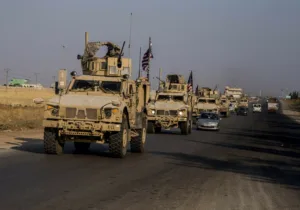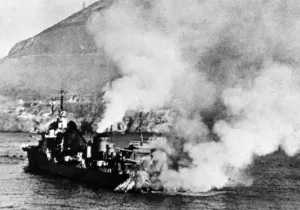As should already be clear from this series’ first three essays (here, here, and here), the Christian realist just war tradition—a moral framework characterized by both spurs and restraints to action—contrasts with the other principal ways that civilizations have, throughout history, considered the morality of going to war.
First, against militarism—and its sometime-near equivalent, holy war—just war refuses the enthusiastic lust for war. In place of the desire for war for its own sake, just war asserts the primacy of peace. Seen through just war eyes, war—however moral or necessary—is a tragedy, not a sought-for occasion for personal, national, or deific aggrandizement. As the captain of Gondor reminds us, the sword is not to be loved for its sharpness, the arrow for its swiftness, or the warrior for his glory, per se. Such things are admired only in light of the good things they defend, which are the right objects of our love.
On the other end of the spectrum, just war stands against both secular and religious expressions of pacifism. Rejecting the absolute moral prohibition against war, just war contends that war—however tragic—may under certain conditions be morally permitted or even obligatory. The primacy of peace over war, therefore, has limits. As C.S. Lewis noted, if war can sometimes be just then it follows that peace can sometimes be unjust. The vocation of peacemaking is not antithetical to warmaking. Rather, it often happens that peace is only found after contesting parties move through conflict. While accepting that war is indeed a great evil, just war does not accept that it’s the greatest of evils. Indeed, included among those greater evils is trying to live in “peace” while standing by as the innocent are run over roughshod.
Lastly, just war stands against the amoral, self-interested pragmatism of pure forms of realism that reject the infiltration of morality into issues of State. For certain kinds of realists, there are no moral reasons, per se, that spur a nation to fight. Rather, it is only when a state’s vital national interests are at risk that one unleashes the hounds of war. Once launched, moreover, there are no moral limits to how one fights—neither in theory nor in actual practice. While such a realist will see the idea of moral realism to be a contradiction in terms, the just war tradition that I have been elucidating here is a product of what can best be described as the Christian realist tradition. Against the assertions of its near cousin, the Christian realist insists that the “Christian” modifier can be—must be—morally operative. Any given war, for the Christian realist, must be moral or it should not be at all. Moreover, moral motivations for fighting can move beyond what are traditionally understood to be vital national interests. They can include the rescue of the aggressed-against innocent in far-flung regions of the world. Lastly, whereas the realist sees war as merely the extension of everyday politics, the just warrior is bound to view war as a disruption of proper politics. Therefore, the Christian realist will be interested in moral restraints that limit this disruption as much as possible, even as they commit to doing whatever is necessary to achieve appropriate war aims.
Nevertheless, despite contrasts like those above—and there are many more of them—it is not all contrast. There are certain affinities shared between just war and its alternatives. Keeping a focus on its correspondence with realism, for example, the just warrior, while asserting that war is a disruption of proper politics, acknowledges that this is frankly nothing new—all human life has, since the fall, been lived in disruption of what, properly, ought to be. And moral responsibility demands that this fact be factored into our deliberations in how we behave in the world.
The Christian realist admits the criticality of other facts as well. So, while the term “Christian” as a describing word is an essential modifier, the noun—realism—is just as important. Regarding facts, one particularly striking cousin-similarity between the classical- and moral realist can be seen in their shared assertion that the question of whether embarking upon a particular war is just—or justified—is not, in the final sense, a merely moral question. That the realist asserts this isn’t surprising. That the just warrior—the Christian realist—also asserts this is perhaps more surprising. But as we’ll see, the just war moral framework has, built right into it, the understanding that moral judgements cannot, they must not—that’s to say ought not—be made in abstraction, deracinated from certain cold, unrelenting, and immovable facts.
Recognizing this is essential. The just war moral framework demands that the relationship between principles and facts be symbiotic—mutually interdependent and influencing. Principles, indeed, are to be brought to bear upon the facts—and principles must spur us toward certain kinds of responses to certain sets of facts. Christian norms will demand that in light of the fact that our neighbor is being assaulted we must come to his rescue. But facts, themselves, are to be permitted to influence principles, even to the point of restraining duties that might otherwise be incumbent to pursue in light of principles. It may be a fact that it is plain to see that no effort to save our assailed neighbor has any chance of being successful, but, rather, is likely to escalate the horrors and lead to the harm of other innocents. In light of such facts, it may be that we stand down. Restraint in this situation—because we have not been able to fulfill our duty to our neighbor—is a tragedy.
This is to say, as I have said, that the just war framework is not a simple checklist by which you can simply determine, if certain requirements get ticked off, that war is the thing to do. It is a tool to promote moral reasoning, casuistic—or case driven—moral reasoning. Through the framework’s various criteria, just war reasoning helps us to identify relevant moral norms and to apply them to a specific context. The framework governing just war moral reasoning is traditionally divided into two primary categories. The first is the jus ad bellum, which asks, essentially: when is it right to fight? The second category is the jus in bello: how do you rightly fight that fight that’s right to fight? Let us call these the jab and the jib. Both the jab and the jib are characterized by considerations of both moral principles and morally relevant facts. Let us take them in turn.
The jab’s primary aim is to assist a nation’s legitimate sovereign—the authority over which there is no one greater charged with the care of the political community—in determining when nothing else but proportionate military force has any realistic chance of rescuing the sufficiently threatened innocent, requiting gross injustices, or punishing grave evil with the aim of ending conflict and restoring or imposing order and justice and, thereby, peace.
Within this broad ambition are two distinct but overlapping kinds of criteria. On the one hand are what can be called the deontological criteria: legitimate authority, just cause, and right intention. Each of these criterion have to be in place in order for a war to be just. These criteria map directly onto the three primary political goods of order, justice, and peace. We’ll dig deeper into each criterion as this series progresses, but it’s important to note the reactionary nature of the just war tradition. In the just war view, a legitimate authority can only lead his nation to war if there is a just cause. In the Christian realist tradition, the three just causes are the protection of the innocent, taking back things wrongly taken, and punishing evil. Note that there is nothing self-initiating about these things. The just warrior does not inaugurate new cycles of violence, they only react to sufficiently unjust violence already underway—or imminently so. The intention behind reacting to the injustice is to end it. Wars that are right to fight are right to win. Winning will mean different things in different situations, but we do not fight if we have no real intention of ending the injustice that started the fight in the first place.
These deontological requirements do not merely provide permission for war. The presence of a sufficiently grave just cause implies an imperative—something must be done. More than permission, it signals obligation. This, too, is what is implied by calling these requirements deontological. They impose a duty. Here the distinction between the classical realist and the moral realist is particularly keen.
But the deontological criteria are not the only ones in play. Another set of criteria, a prudential set, is also operative. While the tabulation varies, I count three primary prudential requirements: last resort, proportionality of ends, and probability of success. These criteria require that we consider whether going to war—however justified or moral—is wise. Fighting to win certain wars—fighting to overturn the injustices that started the war—are sometimes a bridge too far. Sometimes fighting will only exacerbate the injustices in play, making most things a lot worse. Prudence sometimes commands restraint. Wisdom might reveal that we have a duty to stand down from doing our duty. Here, tragically, realism and moral realism come back into a similar orbit.
Within the framework of the jib, we see something similar. Traditionally, there are two primary criteria that guide us in assessing how to rightly fight the fight that’s right to fight: proportionality and discrimination. These are restraining elements, limiting the kinds of direct harm we can do as well as who we can directly harm in the first place. Here, again, the distance between the two kinds of realism comes back into view. However, there is a third element that ought to be added to Christian realism’s jib considerations: military necessity.
Necessity, really, isn’t a third element—it should be placed up front. In pole position, military necessity reminds us, first, of a simple truism: if a military action isn’t necessary, don’t do it. This, like proportionality and discrimination, signals a restraint. However, military necessity also has deontological dimension—if it is necessary, the presumption is to do it. Necessary for what? For achieving war aims—that is, necessary for victory. Happy, again, is our realist cousin. The presence of military necessity within the jib criteria allows the jib to better mirror the jab in commanding both duty and prudence—both spurs and restraints.
More needs to be said on these spurs and restraints. More will be. Next week we’ll begin our exploration of the individual criterion with a deeper dive in the jab’s requirement of legitimate authority.






